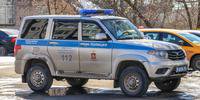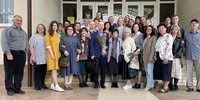The Case of Sidorenko in Krasnodar
Filter
- #
Senior investigator of the FSB of the Russian Federation for the Krasnodar Territory, Lieutenant Colonel of Justice Nikita Rudenko initiates a criminal case against 64-year-old Pavel Sidorenko.
The investigation claims that no later than February 15, 2019, Sidorenko "had a criminal intent to commit illegal actions for further participation in the activities of a local religious organization prohibited by law."
- #
Judge of the Oktyabrsky District Court Aleksandr Verkhohlyad issues a search in the home of Pavel Sidorenko, who lives in the village of Prigorodny.
- #
- #
Pavel Sidorenko is being prosecuted under Part 2 of Article 282.2 of the Criminal Code of the Russian Federation.
- #
Pavel Sidorenko is prescribed a comprehensive outpatient psychological and psychiatric forensic examination.
- #
In the case of a believer, a comprehensive religious examination is appointed.
- #
The case is submitted to the Goryacheklyuchevsky City Court of the Krasnodar Territory. The referee is Zhanna Velichko.
- #
The hearings in the case of Pavel Sidorenko begin. About 35 people gather outside the courthouse to support the believer.
The judge attaches to the case file the defendant's petition to terminate the criminal case, but postpones it for consideration during the trial.
The court refuses to satisfy Pavel's request to return the case to the prosecutor.
The prosecutor reads out the charge of extremism. Pavel Sidorenko pleads not guilty, emphasizing that he did not commit any crimes.
The questioning of prosecution witnesses begins. One of them gives the defendant a positive characteristic: responsible, conscientious, there are "absolutely no complaints" against the believer.
- #
Three prosecution witnesses again did not appear at the hearing. Despite the objections of the defense, the court reads out the written testimony of one of them. The court decides to bring the rest to the hearing forcibly.
A relative of Pavel Sidorenko is being interrogated. About his communication with the defendant, he says: "We talk on the phone on family topics, we are interested in each other's lives. We have a normal family relationship." According to him, the defendant never offered him to join any banned religious organization.
The court rejects the request to waive the appointed lawyer.
A support group of about 30 people gathers outside the courthouse, five of whom are allowed into the courtroom.
- #
The prosecutor names the materials of the volumes of the case, which are planned to be examined at further court sessions. They contain video recordings from the defendant's work, audio files of his telephone conversations, conclusions of psychological, psychiatric, phonoscopic and religious examinations, as well as a poem on religious topics, which, according to the prosecutor, "praises participation in the activities of the LRO."
In court, recordings of telephone conversations of the defendant are listened to.
- #
To support Pavlo Sidorenko, 25 people come to the courthouse, only 7 of them are allowed to attend the hearing.
The court examines the files from the laptop seized from the defendant during the search. Sidorenko emphasizes that in the watched videos there are no calls for violence, enmity, as well as propaganda of religious superiority.
The defendant points out that the expert's statements about the video are far-fetched. In addition, Sidorenko draws attention to the expert's distortion of the name of religion, which indicates a biased attitude of the specialist towards Jehovah's Witnesses and casts doubt on the objectivity of his conclusions.
- #
A support group of 27 people comes to the courthouse. 12 of them are allowed into the hall.
A video recording of one of the worship services is watched, in which believers, among other things, sing religious songs, and also discuss how Bible study helps a person to know God better.
- #
The court examines the video footage from the camera installed at Sidorenko's work. In this recording, believers discuss meetings of fellow believers via video link.
- #
20 listeners were admitted to the meeting. The court begins to get acquainted with the conclusion of the religious examination. Sidorenko submits a petition to participate in this consideration. He explains this by saying that he knows the religion of Jehovah's Witnesses well and will be able to give explanations if necessary.
Judge Zhanna Velichko partially granted the petition, allowing the believer to comment on the expert's conclusions.
- #
21 listeners are allowed into the hall.
Commenting on the conclusions of the expert Boyko, the defendant draws attention to the fact that the expert refers to words that do not belong to Sidorenko. The results of phonoscopic examination are examined.
- #
The defense draws attention to the factual contradictions in the case materials. For example, the decision to initiate the case states that at that time (January 2022) Sidorenko lived in his house in Goryachy Klyuch. However, according to the contract for the sale of the house, the believer was removed from the register at this address back in June 2021.
The court examines the Orthodox "Biblical Encyclopedia" edited by Archimandrite Nicephorus, published in 1891. Sidorenko draws the court's attention to the fact that the prosecution considered this book as evidence of his guilt only because the name Jehovah appears in it.
At the request of the believer, the court attaches medical documents confirming the presence of a serious illness in his daughter, as well as health problems in himself and his wife.
- #
Sidorenko asks the court to exclude his phone from the evidence. The believer explains that he could not talk to him about the Bible in 2019, as he bought it only two years later. As proof, he cites an official response from the manufacturer, confirming that this model went on sale in 2021.
The judge shall postpone consideration of this issue until the final decision is made.
- #
The case is submitted to the Goryacheklyuchevskoy City Court of the Krasnodar Territory. The referee is Zhanna Velichko.
- #
The prosecutor is requesting a three-year suspended sentence for Pavel Sidorenko.
- #
To support the believer, 43 people come to the courthouse, but only five are allowed into the courtroom.
The defense and the defendant speak. The lawyer notes: "All the evidence presented by the investigation was contradictory, the witnesses were confused in their testimonies, did not give accurate explanations. Therefore, I believe that the investigation did not prove Sidorenko's guilt, and Sidorenko's guilt was not established at the hearing."
Their statements are attached to the case file.
- #
"My views, as a believing Christian with 33 years of experience, are based on love for God and love for people and have nothing to do with extremism," the believer delivered his last speech.
The last word of the defendant Pavel Sidorenko in Krasnodar

